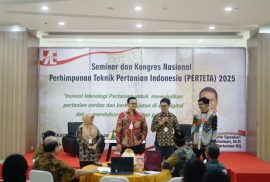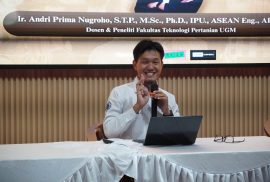
Ho Chi Minh, 13–15 November 2025 — Coffee is one of Indonesia’s most strategic agricultural commodities, valued not only for its economic importance but also as a significant part of the nation’s cultural identity and daily life. As one of the world’s major coffee producers, Indonesia faces the challenge of improving product quality, production efficiency, and global competitiveness. Responding to these challenges, the Department of Agricultural and Biosystems Engineering (DTPB) of the Faculty of Agricultural Technology, Universitas Gadjah Mada (FTP UGM), together with Universitas Ciputra Surabaya, established a strategic research collaboration through the Flagship Collaborative Research Program (RIKUB) initiated by the Ministry of Higher Education, Science, and Technology (Kemdiktisaintek).
RIKUB is designed to promote cross-institutional research that focuses on innovative and sustainable solutions for industry challenges. Within this program, UGM and Universitas Ciputra developed a research theme titled “Sustainability Strategies and Technological Applications as Drivers of Innovation and Efficiency in Small and Medium-Scale Coffee Industries.” This research aims to provide substantial contributions to Indonesia’s coffee sector, particularly in addressing issues related to technological access, production efficiency, and supply chain management.
The UGM research team consists of Dr. Chandra Setyawan, Dr. Makbul Hajad, Dr. Ansita Gupitakingkin Pradipta, and Dr. Dwi Ayuni, while the Universitas Ciputra team includes Yoseva Maria Pujirahayu, M.B.A., Dr. Teofilus, and Dr. Fahrul Riza. This collaboration merges UGM’s academic expertise in agricultural engineering with Universitas Ciputra’s strength in entrepreneurship and business innovation.
As part of the research series, the team conducted a field visit to Vietnam, one of the world’s largest coffee producers known for its modern, efficient, and well-integrated coffee industry. The visit aimed to explore best practices that could serve as references for enhancing Indonesia’s coffee sector.
Day 1 – Mekatronic Applications for Postharvest Coffee Handling (Ho Chi Minh University of Technology and Education)

The first visit took place at the Faculty of Mechanical Engineering, Ho Chi Minh University of Technology and Education. Discussions focused on potential collaborations in developing mechatronic technologies for postharvest coffee processes—such as sorting, drying, and advanced processing. Mechatronic innovation is viewed as a key driver for modernizing Indonesia’s coffee industry, especially for small and medium enterprises needing cost-effective technology. The team also toured the university’s laboratories and research facilities, gaining insights into how automation and mechanical systems are integrated into Vietnam’s coffee production.
Day 2 – FPT University: Integrating AI for Modern Coffee Technology

On the second day, the team visited FPT University, Ho Chi Minh Campus. The session began with institutional presentations, followed by discussions on potential collaborations in applying artificial intelligence (AI) to enhance precision and efficiency in postharvest coffee technology. Topics included machine-learning-based grading, drying optimization, and sensor-driven quality monitoring. The team also explored FPT’s digital learning environments, offering inspiration for advancing research and education infrastructure in Indonesia.
Day 3 – Industrial Study at Viet Thien Production Trading and Service Company Limited

On the final day, the team visited Viet Thien Production Trading and Service Company Limited, a major Vietnamese coffee company. The visit provided firsthand insights into industrial-scale coffee processing, supply chain management, and marketing strategies that have strengthened Vietnam’s position as a global coffee exporter. These lessons are expected to support the development of strategies for elevating Indonesia’s coffee value chain, particularly for small and medium-scale producers.
This series of activities aligns closely with several Sustainable Development Goals (SDGs), including:
– SDG 2: Zero Hunger – strengthening sustainable agricultural systems and empowering coffee farmers;
– SDG 8: Decent Work and Economic Growth – fostering economic opportunities and productivity improvements;
– SDG 9: Industry, Innovation, and Infrastructure – promoting technological innovation across the coffee value chain;
– SDG 12: Responsible Consumption and Production – encouraging efficient and sustainable production practices.
The research team hopes that this collaboration will produce applicable models for technology and business development that can be implemented in Indonesia. By learning from Vietnam’s best practices and expanding international partnerships, the project aims to accelerate the transformation of Indonesia’s coffee industry toward a more modern, sustainable, and globally competitive system.




